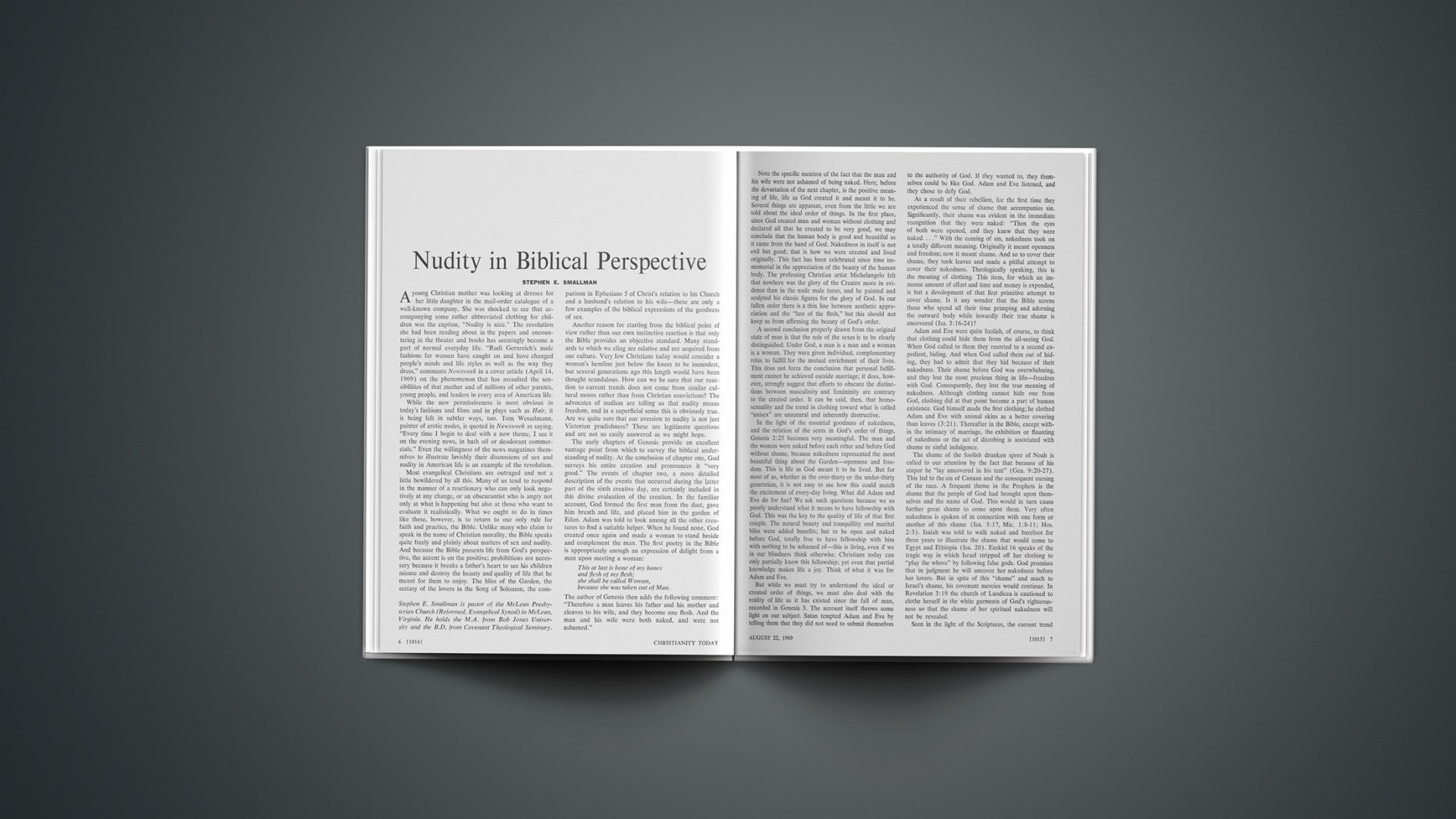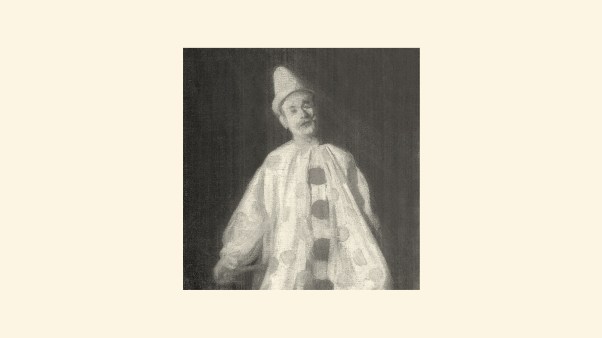A young Christian mother was looking at dresses for her little daughter in the mail-order catalogue of a well-known company. She was shocked to see that accompanying some rather abbreviated clothing for children was the caption, “Nudity is nice.” The revolution she had been reading about in the papers and encountering in the theater and books has seemingly become a part of normal everyday life. “Rudi Gernreich’s nude fashions for women have caught on and have changed people’s minds and life styles as well as the way they dress,” comments Newsweek in a cover article (April 14, 1969) on the phenomenon that has assaulted the sensibilities of that mother and of millions of other parents, young people, and leaders in every area of American life.
While the new permissiveness is most obvious in today’s fashions and films and in plays such as Hair, it is being felt in subtler ways, too. Tom Wesselmann, painter of erotic nudes, is quoted in Newsweek as saying, “Every time I begin to deal with a new theme, I see it on the evening news, in bath oil or deodorant commercials.” Even the willingness of the news magazines themselves to illustrate lavishly their discussions of sex and nudity in American life is an example of the revolution.
Most evangelical Christians are outraged and not a little bewildered by all this. Many of us tend to respond in the manner of a reactionary who can only look negatively at any change, or an obscurantist who is angry not only at what is happening but also at those who want to evaluate it realistically. What we ought to do in times like these, however, is to return to our only rule for faith and practice, the Bible. Unlike many who claim to speak in the name of Christian morality, the Bible speaks quite freely and plainly about matters of sex and nudity. And because the Bible presents life from God’s perspective, the accent is on the positive; prohibitions are necessary because it breaks a father’s heart to see his children misuse and destroy the beauty and quality of life that he meant for them to enjoy. The bliss of the Garden, the ecstasy of the lovers in the Song of Solomon, the comparison in Ephesians 5 of Christ’s relation to his Church and a husband’s relation to his wife—these are only a few examples of the biblical expressions of the goodness of sex.
Another reason for starting from the biblical point of view rather than our own instinctive reaction is that only the Bible provides an objective standard. Many standards to which we cling are relative and are acquired from our culture. Very few Christians today would consider a woman’s hemline just below the knees to be immodest, but several generations ago this length would have been thought scandalous. How can we be sure that our reaction to current trends does not come from similar cultural mores rather than from Christian convictions? The advocates of nudism are telling us that nudity means freedom, and in a superficial sense this is obviously true. Are we quite sure that our aversion to nudity is not just Victorian prudishness? These are legitimate questions and are not so easily answered as we might hope.
The early chapters of Genesis provide an excellent vantage point from which to survey the biblical understanding of nudity. At the conclusion of chapter one, God surveys his entire creation and pronounces it “very good.” The events of chapter two, a more detailed description of the events that occurred during the latter part of the sixth creative day, are certainly included in this divine evaluation of the creation. In the familiar account, God formed the first man from the dust, gave him breath and life, and placed him in the garden of Eden. Adam was told to look among all the other creatures to find a suitable helper. When he found none, God created once again and made a woman to stand beside and complement the man. The first poetry in the Bible is appropriately enough an expression of delight from a man upon meeting a woman:
This at last is bone of my bones
and flesh of my flesh;
she shall be called Woman,
because she was taken out of Man.
The author of Genesis then adds the following comment: “Therefore a man leaves his father and his mother and cleaves to his wife, and they become one flesh. And the man and his wife were both naked, and were not ashamed.”
Note the specific mention of the fact that the man and his wife were not ashamed of being naked. Here, before the devastation of the next chapter, is the positive meaning of life, life as God created it and meant it to be. Several things are apparent, even from the little we are told about the ideal order of things. In the first place, since God created man and woman without clothing and declared all that he created to be very good, we may conclude that the human body is good and beautiful as it came from the hand of God. Nakedness in itself is not evil but good; that is how we were created and lived originally. This fact has been celebrated since time immemorial in the appreciation of the beauty of the human body. The professing Christian artist Michelangelo felt that nowhere was the glory of the Creator more in evidence than in the nude male torso, and he painted and sculpted his classic figures for the glory of God. In our fallen order there is a thin line between aesthetic appreciation and the “lust of the flesh,” but this should not keep us from affirming the beauty of God’s order.
A second conclusion properly drawn from the original state of man is that the role of the sexes is to be clearly distinguished. Under God, a man is a man and a woman is a woman. They were given individual, complementary roles to fulfill for the mutual enrichment of their lives. This does not force the conclusion that personal fulfillment cannot be achieved outside marriage; it does, however, strongly suggest that efforts to obscure the distinctions between masculinity and femininity are contrary to the created order. It can be said, then, that homosexuality and the trend in clothing toward what is called “unisex” are unnatural and inherently destructive.
In the light of the essential goodness of nakedness, and the relation of the sexes in God’s order of things, Genesis 2:25 becomes very meaningful. The man and the woman were naked before each other and before God without shame, because nakedness represented the most beautiful thing about the Garden—openness and freedom. This is life as God meant it to be lived. But for most of us, whether in the over-thirty or the under-thirty generation, it is not easy to see how this could match the excitement of every-day living. What did Adam and Eve do for fun? We ask such questions because we so poorly understand what it means to have fellowship with God. This was the key to the quality of life of that first couple. The natural beauty and tranquillity and marital bliss were added benefits; but to be open and naked before God, totally free to have fellowship with him with nothing to be ashamed of—this is living, even if we in our blindness think otherwise. Christians today can only partially know this fellowship; yet even that partial knowledge makes life a joy. Think of what it was for Adam and Eve.
But while we must try to understand the ideal or created order of things, we must also deal with the reality of life as it has existed since the fall of man, recorded in Genesis 3. The account itself throws some light on our subject. Satan tempted Adam and Eve by telling them that they did not need to submit themselves to the authority of God. If they wanted to, they themselves could be like God. Adam and Eve listened, and they chose to defy God.
As a result of their rebellion, for the first time they experienced the sense of shame that accompanies sin. Significantly, their shame was evident in the immediate recognition that they were naked: “Then the eyes of both were opened, and they knew that they were naked.…” With the coming of sin, nakedness took on a totally different meaning. Originally it meant openness and freedom; now it meant shame. And so to cover their shame, they took leaves and made a pitiful attempt to cover their nakedness. Theologically speaking, this is the meaning of clothing. This item, for which an immense amount of effort and time and money is expended, is but a development of that first primitive attempt to cover shame. Is it any wonder that the Bible scorns those who spend all their time primping and adorning the outward body while inwardly their true shame is uncovered (Isa. 3:16–24)?
Adam and Eve were quite foolish, of course, to think that clothing could hide them from the all-seeing God. When God called to them they resorted to a second expedient, hiding. And when God called them out of hiding, they had to admit that they hid because of their nakedness. Their shame before God was overwhelming, and they lost the most precious thing in life—freedom with God. Consequently, they lost the true meaning of nakedness. Although clothing cannot hide one from God, clothing did at that point become a part of human existence. God himself made the first clothing; he clothed Adam and Eve with animal skins as a better covering than leaves (3:21). Thereafter in the Bible, except within the intimacy of marriage, the exhibition or flaunting of nakedness or the act of disrobing is associated with shame or sinful indulgence.
The shame of the foolish drunken spree of Noah is called to our attention by the fact that because of his stupor he “lay uncovered in his tent” (Gen. 9:20–27). This led to the sin of Canaan and the consequent cursing of the race. A frequent theme in the Prophets is the shame that the people of God had brought upon themselves and the name of God. This would in turn cause further great shame to come upon them. Very often nakedness is spoken of in connection with one form or another of this shame (Isa. 3:17; Mic. 1:8–11; Hos. 2:3). Isaiah was told to walk naked and barefoot for three years to illustrate the shame that would come to Egypt and Ethiopia (Isa. 20). Ezekiel 16 speaks of the tragic way in which Israel stripped off her clothing to “play the whore” by following false gods. God promises that in judgment he will uncover her nakedness before her lovers. But in spite of this “shame” and much to Israel’s shame, his covenant mercies would continue. In Revelation 3:19 the church of Laodicea is cautioned to clothe herself in the white garments of God’s righteousness so that the shame of her spiritual nakedness will not be revealed.
Seen in the light of the Scriptures, the current trend toward nudity and sexual “freedom” is but another manifestation of man’s rebellion against God. While it is shocking, it should not be surprising in view of what the Bible teaches about the sinfulness of man. In this godless age when there is almost no sense of the holiness of God, there is also no sense of shame. Adam and Eve were terribly ashamed because though they had sinned, they still understood the character of God. That is not so today. And this fact should cause some thoughtfulness on the part of concerned Christians. At the root of our moral revolution is a spiritual problem. We must realize that while it is imperative that we resist the tide of moral corruption, if there is to be any permanent change there must be a spiritual change.
Young people today are being told that nudity means freedom. As we have seen, that is true. Or better, it was true before sin became a part of human life. But those who have no concept of a holy God whose law is absolute have no concept of sin. On that basis, then, there is no reason for adhering to any moral code—an idea that is being argued widely in our courts today. This may make modern conduct more understandable, but it certainly doesn’t make it any more right. The fact is that there is a holy God, and there is such a thing as sin; whether or not one senses the shame of sin, it is still there. Nudity on film, in books and magazines, in TV advertisements, is not freedom; it is shame. And by flaunting our shame we are becoming even more hardened in our sin and our defiance of God. In the process, we are destroying our society.
But there is a spiritual answer to this spiritual and moral revolution. Just as God gave adequate clothing after the Fall, he also provides that which truly covers our sin and our shame. Through Christ, we can know the freedom and openness that Adam once knew. The Christian open and free before God is pictured not as naked, however, but as clothed in a robe of righteousness.
This is not our righteousness, or innocence—that has been lost and we are shamefully naked—but Christ’s righteousness. He covers us so that we do not need to be ashamed before God. This is a theme in the Old Testament (Job 29:14; Ps. 132:16; Isa. 52:1; 61:10; Zech. 3:4) and in the New (Luke 15:22; Matt: 22:11, 12; 2 Cor. 5:2, 3; Rev. 3:18). God gives us garments to cover our shame. In the Book of Revelation, the saints are pictured as standing before God in white robes (6:11; 7:9, 13, 14; 19:7, 8).
We ought to be outraged and indignant about what is happening to our society. But also, what is perhaps more important for us as Christians, we ought to look with pity and compassion on those around us. Modern attempts to find freedom without God might be more sophisticated, but they uncover the same raw shame that Adam and Eve encountered when they thought they could do without God. In ignorance and sinfulness, men think that by returning to nakedness, they can find that freedom they sense they have lost. Poor, poor fools. Freedom can be found only in the return to God.
Stephen E. Smallman is pastor of teh McLean Presbyterian churhc (Reformed Evangelical Synod) in McLean Virginia. Helds the M.A. from Bob Jones University and the B.D. from Covenant Theological Seminary.










